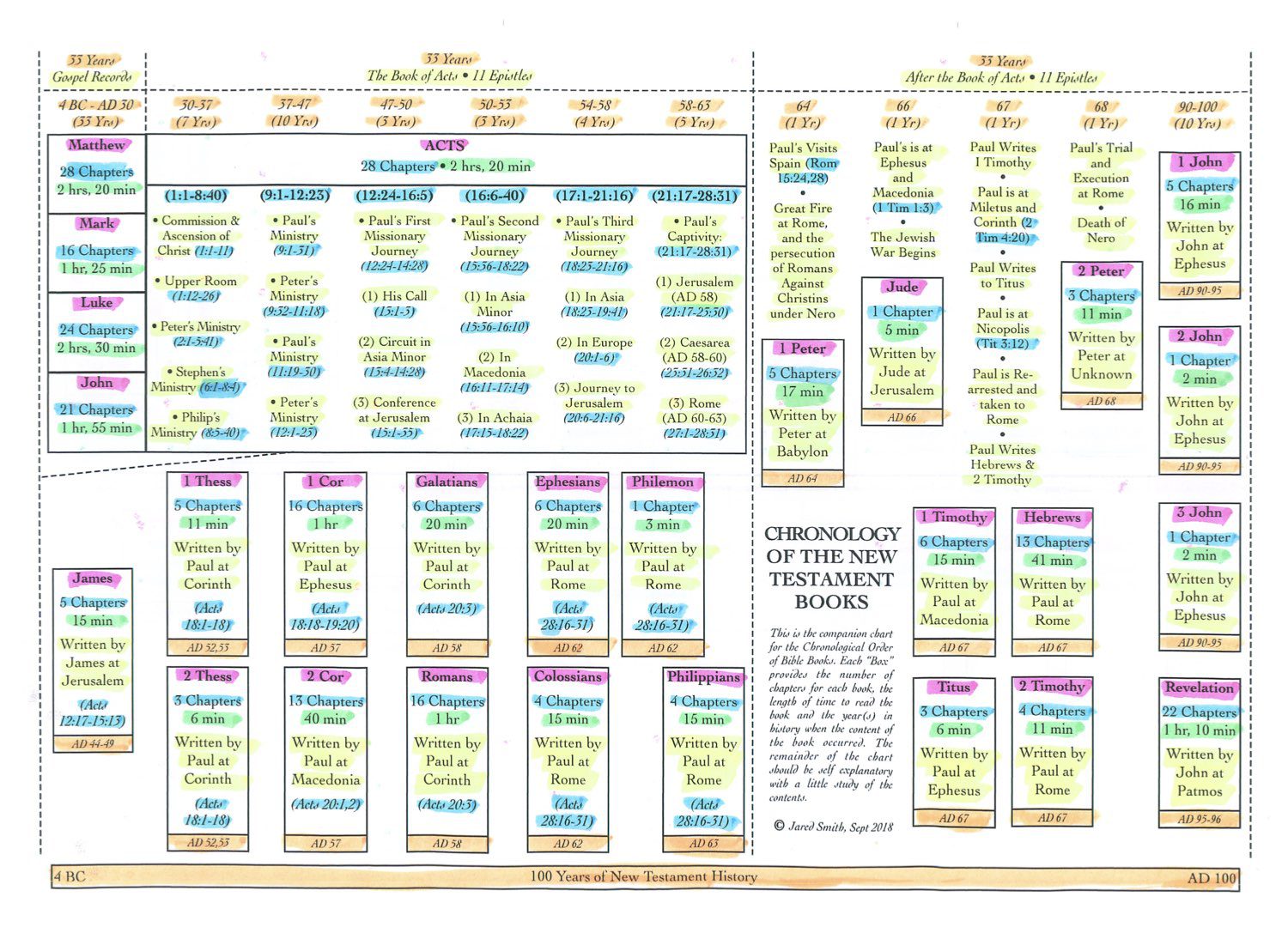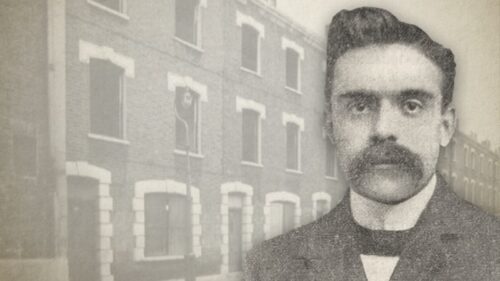
The Letter Of Jude
The Background
The letter of Jude was written in the year 66AD to a group of churches. The chart below provides a bird’s-eye view of the chronological order for the books of the New Testament.

John Gill, “Commentary On The New Testament Scriptures”:
“That this epistle was written by Jude, one of the twelve apostles of Christ, and not by Jude the fifteenth bishop of Jerusalem, who lived in the time of Trojan, a little before Bar Cocab, the false Messiah, as Grotius thought, is evident from his being called, in the epistle itself, the brother of James, and which is confirmed by all copies; and its agreement with the second epistle of Peter shows it to have been written about the same time, and upon the same occasion. As to Jude’s not calling himself an apostle, but a servant of Jesus Christ, it may be observed, that the latter is much the same with the former, and the Apostle Paul sometimes uses them both, as in (Romans 1:1) (Titus 1:1), and sometimes neither, as (1 Thessalonians 1:1 2 Thessalonians 1:1 Philemon 1:1), and sometimes only servant, as Jude does here, (Philippians 1:1), though in some copies of the title of this epistle he is called “Jude the Apostle”; and as to Jude’s making mention of the apostles as if he was later than they, and not of their number, (Jude 1:17), it may be returned for answer to it, that the Apostle Peter expresses himself much in the same manner, (2 Peter 3:2), where some copies, instead of “us the apostles”, read “your apostles”, (see Gill on “2 Peter 3:2”); moreover, Jude seems to cite a passage out of Peter, as Peter in the same chapter cites the Apostle Paul, which only shows agreement in their doctrine and writing; and at most it only follows from hence, that Jude wrote after some of the apostles, as Paul and Peter, who had foretold there would be mockers in the last time; and that Jude had lived to be a witness of the truth of what they had said; nor does he exclude himself from their number. And that this epistle is a genuine one appears from the majesty of its style, the truth of doctrine contained in it, and its agreement with the second epistle of Peter, and from the early reception of it in the churches. Eusebius says, it was reckoned among the seven catholic epistles, and was published in most churches; though he observes, that many of the ancients make no mention of it: but certain it is, that several of the ancient writers before him do make mention of it, and cite it as genuine, as Clemens Alexandrinus, Tertullian, and Origen f4: and as for the prophecy of Enoch, cited in this epistle, it is not taken out of an apocryphal book, that bears that name, for the apostle makes no mention of any writing of his, but of a prophecy; and had he cited it out of that book, as it was truth, it can no more prejudice the authority of this epistle, than the citations made by the Apostle Paul out of the Heathen poets can affect his epistles: and whereas there is an account also given in this epistle of a dispute about the body of Moses, nowhere else to be met with, supposing it to be understood of his real body, of which (see Gill on “Jude 1:9”); this can be no more an objection to the genuineness of this epistle, than the mention of Jannes and Jambres, who withstood Moses, by the Apostle Paul, (2 Timothy 3:8), is an objection to an epistle of his, whose names are not to be met with in other parts of Scripture; but were what were known by tradition, as might be the case here. The epistle is called “catholic”, or “general”, because it is not written to any particular person or church, but to the saints in general, and it may be to the same persons that Peter wrote his; (1 Peter 1:1 2 Peter 1:1), and who seem to be chiefly the believing Jews; (see Jude 1:5,17), though the Syriac version of (Jude 1:1) reads, “Jude, a servant of Jesus Christ” — amm[l, “to the nations”, or “Gentiles, called”, etc. the design of the epistle to both is to exhort them to continue in the faith, and contend for it; and to describe false teachers, to point out their principles, practices, and dreadful end, that so they might shun and avoid them.”
Robert Hawker, “Bible Chapter Summaries And Reflections”:
“Jude is particularly spoken of as the brother of James, perhaps to distinguish him from Judas the Traitor. For otherwise, it was more the custom to speak of the Jews by descent. Jude lived the last of all the Apostles, except John. And it could not be well less than thirty years after Christ’s ascension, that he wrote this Epistle. He hath evidently followed the Apostle Peter, in his Second Epistle, and thereby confirmed the words of God, that, in the mouth of two or three witnesses, every word shall be established (Deut. 17:6; 2 Cor. 12:1).
The design of God the Holy Ghost, in sending this Epistle generally to the Church, seems very evident from its contents. Heresies had at this time sprung up, and the Church was infested with them. It is our mercy, that Jude as well as John, lived to see them. For under God the Holy Ghost, we owe our possession of those blessed Epistles to this cause. And both the origin and support of heresies, we are expressly told, is, that the truth of God may be thereby manifested among us.
I have only to request the reader, that here, as in all the former books of Divine Inspiration, we may enter upon the study of it with prayer, that we may end it in praise!
Summary—The opening of this Epistle is truly sweet. Jude addresseth all he hath to say to the Church. It is to you, Beloved, Jude saith that he writes. He then, through the greater Part of the Chapter, points out the awful state of the reprobate. But still it is to the Church he speaks of those things, for their consolation and instruction. Towards the end, he points out the safety and blessedness of the Church, and concludes in praise.
Reflections—Reader! Hath God the Holy Ghost in his gracious teachings blest to your perusal and mine, this precious portion of his sacred Word? Are we that of distinguished people, who are sanctified by God the Father, preserved in Jesus Christ, and called? Oh! Then let us both beg another blessing from our bountiful God, and ask for grace, that on our bended knees we may cry out with the Apostle, “thanks be unto God for his unspeakable gift!” And we desire to praise the Almighty Minister of his Church, even God the Holy Ghost, for the grace he hath shewn, in forewarning, and fore-arming his people, concerning the last days heresies. Truly, Lord, we live to see them. We live among them. And thanks tour God, for giving his Church such plain features of character, as are here drawn by his servant, and by which, under the Lord’s teaching, we cannot fail to know them. Oh! What shall thy people say; what praise shall thy people offer, while reading the striking distinction, which mark thy redeemed from the world. The one, sanctified, preserved, and called; the other, ordained of old to this condemnation, denying the only Lord God, and our Lord Jesus Christ! We bless our God for the faithfulness of his servant Jude, in this Scripture. And, while we look to the eternal Spirit with praise for making him faithful, we would honor the instrument, whom God so graciously made use of in the work. Jude, the servant of Jesus Christ, and brother of James, we thank thee for thy labor of love. The whole Church, in all ages have found cause to thank thee for it, from thy time to the present hour. And, oh! Lord the Spirit, give grace to thy faithful now to testify their sense of the mercy vouchsafed the church in this precious Epistle, “by earnestly contending for the faith, once delivered unto saints.” Oh! Keep thy people, Lord, from being led away with the speciousness of the times! Oh! For an holy boldness, from the Lord, to stand up for the Lord, and to resist the bait of supposing we can honor God’s glory, while silently sitting and mingling with those who dishonor his Godhead, disown the person and Work of the Spirit, and boldly deny the electing love of God the Father. Unto such assemblies, my soul, be not thou united! Lord Jesus! Do thou keep all thine from this, and every other evil until thou shalt bring all thy redeemed home, and “present them faultless before thy presence of thy glory wit exceeding joy.” Amen.”
“All scripture is given by inspiration of God [inclusive of Jude’s letter], and is profitable for doctrine, for reproof, for correction, for instruction in righteousness: that the man of God may be perfect, throughly furnished unto all good works.”—2 Timothy 3:16,17
Editor, Jared Smith
The Letter
Jude, the servant of Jesus Christ, and brother of James, to them that are sanctified by God the Father, and preserved in Jesus Christ, and called: Mercy unto you, and peace, and love, be multiplied. Beloved, when I gave all diligence to write unto you of the common salvation, it was needful for me to write unto you, and exhort you that ye should earnestly contend for the faith which was once delivered unto the saints. For there are certain men crept in unawares, who were before of old ordained to this condemnation, ungodly men, turning the grace of our God into lasciviousness, and denying the only Lord God, and our Lord Jesus Christ. I will therefore put you in remembrance, though ye once knew this, how that the Lord, having saved the people out of the land of Egypt, afterward destroyed them that believed not. And the angels which kept not their first estate, but left their own habitation, he hath reserved in everlasting chains under darkness unto the judgment of the great day. Even as Sodom and Gomorrha, and the cities about them in like manner, giving themselves over to fornication, and going after strange flesh, are set forth for an example, suffering the vengeance of eternal fire. Likewise also these filthy dreamers defile the flesh, despise dominion, and speak evil of dignities. Yet Michael the archangel, when contending with the devil he disputed about the body of Moses, durst not bring against him a railing accusation, but said, The Lord rebuke thee. But these speak evil of those things which they know not: but what they know naturally, as brute beasts, in those things they corrupt themselves. Woe unto them! for they have gone in the way of Cain, and ran greedily after the error of Balaam for reward, and perished in the gainsaying of Core. These are spots in your feasts of charity, when they feast with you, feeding themselves without fear: clouds they are without water, carried about of winds; trees whose fruit withereth, without fruit, twice dead, plucked up by the roots; Raging waves of the sea, foaming out their own shame; wandering stars, to whom is reserved the blackness of darkness for ever. And Enoch also, the seventh from Adam, prophesied of these, saying, Behold, the Lord cometh with ten thousands of his saints, To execute judgment upon all, and to convince all that are ungodly among them of all their ungodly deeds which they have ungodly committed, and of all their hard speeches which ungodly sinners have spoken against him. These are murmurers, complainers, walking after their own lusts; and their mouth speaketh great swelling words, having men’s persons in admiration because of advantage. But, beloved, remember ye the words which were spoken before of the apostles of our Lord Jesus Christ; How that they told you there should be mockers in the last time, who should walk after their own ungodly lusts. These be they who separate themselves, sensual, having not the Spirit. But ye, beloved, building up yourselves on your most holy faith, praying in the Holy Ghost, Keep yourselves in the love of God, looking for the mercy of our Lord Jesus Christ unto eternal life. And of some have compassion, making a difference: And others save with fear, pulling them out of the fire; hating even the garment spotted by the flesh. Now unto him that is able to keep you from falling, and to present you faultless before the presence of his glory with exceeding joy, To the only wise God our Saviour, be glory and majesty, dominion and power, both now and ever. Amen.
Paul The Apostle (?-68AD) was a sovereign grace Baptist preacher. He was appointed by Christ to serve as an Apostle, sent out to the wider regions of the world ministering the gospel primarily to the Gentiles. He is the author of fourteen New Testament letters—1 Thessalonians, 2 Thessalonians, 1 Corinthians, 2 Corinthians, Galatians, Romans, Ephesians, Colossians, Philemon, Philippians, 1 Timothy, Titus, Hebrews and 2 Timothy.






